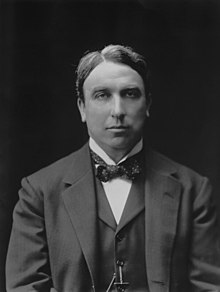Arthur Michael Samuel, 1st Baron Mancroft (6 December 1872 – 17 August 1942) was a British Conservative politician.
The Lord Mancroft | |
|---|---|
 | |
| Chairman of the Public Accounts Committee | |
| In office 1929–1931 | |
| Preceded by | William Graham |
| Succeeded by | Morgan Jones |
| Financial Secretary to the Treasury | |
| In office 1 November 1927 – 5 June 1929 | |
| Prime Minister | Stanley Baldwin |
| Preceded by | Ronald McNeill |
| Succeeded by | Frederick Pethick-Lawrence |
| Secretary for Overseas Trade | |
| In office 4 November 1924 – 1 November 1927 | |
| Prime Minister | Stanley Baldwin |
| Preceded by | William Lunn |
| Succeeded by | Douglas Hacking |
| Member of the House of Lords Lord Temporal | |
| In office 23 December 1937 – 17 August 1942 Hereditary peerage | |
| Preceded by | Peerage created |
| Succeeded by | The 2nd Baron Mancroft |
| Member of Parliament for Farnham | |
| In office 14 December 1918 – 23 March 1937 | |
| Preceded by | Constituency created |
| Succeeded by | Godfrey Nicholson |
| Personal details | |
| Born | Arthur Michael Samuel 6 December 1872 Norwich, England |
| Died | 17 August 1942 (aged 69) Uckfield, England |
| Political party | Conservative |
| Spouse |
Phoebe Fletcher (m. 1912) |
| Education | Norwich School |
Background
editBorn in Norwich,[1] Lord Mancroft was the eldest son of Benjamin Samuel, of Norwich (19 April 1840 – 16 April 1890), and Rosetta Haldinstein (died 29 April 1907, daughter of Philip Haldinstein and wife Rachel Soman), and grandson of Michael Samuel (1799–1857), all of them were Ashkenazi Jews.
Early life
editHe was educated at Norwich School.[2] He was Lord Mayor of Norwich from 1912 to 1913. He was the first Jewish Lord Mayor of Norwich [3] and was made an Honorary Freeman of the City of Norwich in 1928.
Member of Parliament
editin the two General elections of 1910 he stood for the Conservatives in the Stretford division of Lancashire, near Manchester, but was unsuccessful on both occasions. In 1918 he was elected as member of parliament (MP) for Farnham, a seat he would hold until 1937, and served under Stanley Baldwin as Secretary for Overseas Trade from 1924 to 1927 and as Financial Secretary to the Treasury from 1927 to 1929. He was also chairman of the Public Accounts Committee of the House of Commons in 1930 and 1931. Samuel was created a Baronet, of Mancroft, in the City of Norwich in the County of Norfolk, on 15 January 1932,[4] and on 23 December 1937, he was raised to the peerage as Baron Mancroft, of Mancroft (referring to the area around St Peter Mancroft church) in the City of Norwich.[5]
Family
editLord Mancroft married Phoebe Fletcher, daughter of George Alfred Chune Fletcher and wife, in 1912. He died in Uckfield[6] on 17 August 1942,[7] aged 69, and was succeeded in the baronetcy and the barony by his son Stormont Mancroft, 2nd Baron Mancroft. He was also to become a Conservative government minister.
The papers of Lord Mancroft are in the Churchill Archives Centre, Churchill College, Cambridge.[8]
Author
editHe published: "Life of Giovanni Battista Piranesi"; "The Working of the Bill of Exchange with an Explanation of the Overseas Trade Balance"; "The Herring: its Effect on the History of Britain"; and "The Mancroft Essays".[9]
Arms
edit
|
References
edit- ^ "Index entry". FreeBMD. ONS. Retrieved 17 April 2023.
- ^ Who's Who 1938, page 2220
- ^ "Public Service". Jewish Lives Project. Retrieved 3 January 2022.
- ^ "No. 33791". The London Gazette. 19 January 1932. p. 419.
- ^ "No. 34375". The London Gazette. 26 February 1937. p. 1324.
- ^ "Index entry". FreeBMD. ONS. Retrieved 17 April 2023.
- ^ "Mr Arthur Samuel (Hansard)". api.parliament.uk. Retrieved 17 April 2023.
- ^ "The Papers of 1st Baron Mancroft". Archivesearch. Archived from the original on 4 October 2021. Retrieved 5 November 2021.
- ^ "The Papers of 1st Baron Mancroft". rchives centre. University of ambridge. Retrieved 1 January 2022.
- ^ Debrett's Peerage. 2019. p. 3534.
Sources
edit- Kidd, Charles; Williamson, David, eds. (1990). Debrett's Peerage and Baronetage (1990 ed.). New York: St Martin's Press.